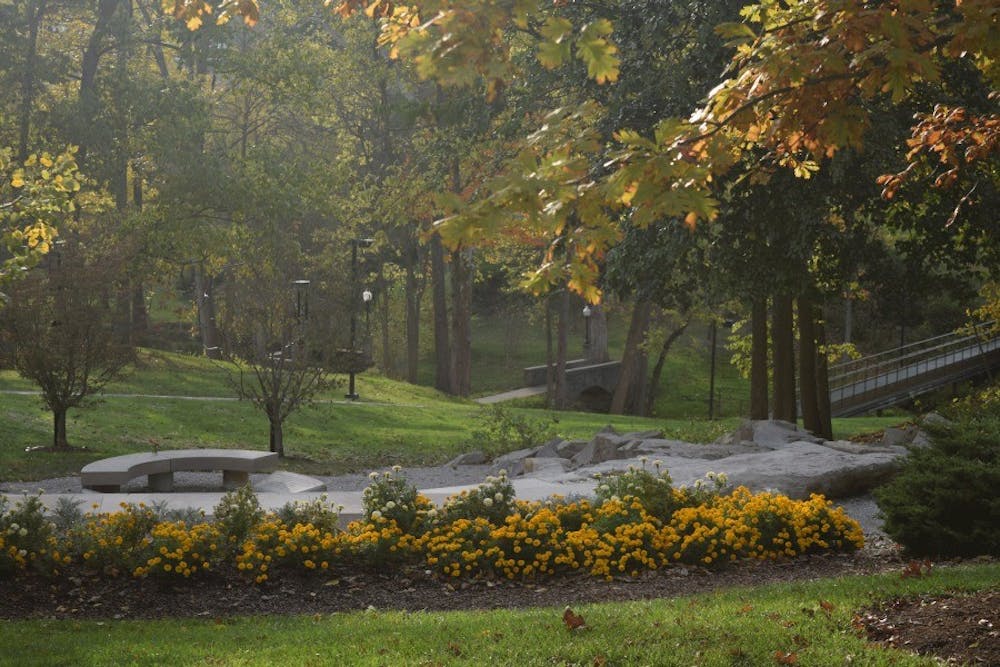The sacrifices of the three men who died in Mississippi are now being honored by chimes hung on Miami's Western Campus during the Freedom Summer Memorial last Sunday.
Photo by Kyle Hayden, The Miami StudentBy Emily Williams, For The Miami Student
Singer Bob Dylan released his album "Another Side of Bob Dylan," featuring the track "Chimes of Freedom" on August 8, 1964, just four days after the bodies of James Chaney, Andrew Goodman and Michael Schwerner were found buried beneath an earthen dam in Mississippi.
The sacrifices of these three individuals were honored at the unveiling of the Freedom Summer Chimes on Sunday afternoon. The ceremony was held at the Freedom Summer Memorial on Miami's Western Campus. Attendees included Freedom Summer veterans and their families, the chimes' designers and Miami President David Hodge.
The audience sat on the benches of the Freedom Summer amphitheater, whose steps are inscribed with newspaper headlines from that historic Mississippi summer. "Student's Told: Watch Out for Klan Wednesday June 17, 1964 Chicago News, Illinois," one reads. The amphitheater now faces three young dogwood trees, one for each young man whose death showed the true gravity of that warning.
On the southwest side of each tree - facing Mississippi - is a tree-like steel structure and, attached to that sculpture, a chime. The branches of the sculpted trees intertwine with those of the real trees with the intention that, as the young dogwoods grow, the true branches will reach far beyond those of the sculptures, weaving through the steel. In keeping with the theme of three, each sculpture features three handcrafted dogwood blossoms.
Former Miami University architect Bob Keller described the intention behind their design.
"We tried to make it more or less an impression of the living trees," he said.
As Keller went on to describe, the sculptures, these impressions of living trees, will still stand even after the trees are no longer alive, as a symbol of the indelible impression the Freedom Summer volunteers left upon the civil rights movement.
Keller said they puzzled over what tones these chimes should play and, in the process, stumbled upon Bob Dylan's "Chimes of Freedom." After realizing the tune was released at the same time the events of Freedom Summer were still unfolding, he said, it seemed meant to be. The lyrics even correspond to the ideals the memorial represents.
"Tolling for the warrior whose strength is not to fight … And for every underdog soldier in the night," Dylan sings in one verse.
Enjoy what you're reading?
Signup for our newsletter
In light of this discovery, they designed the chimes so the tones they play make up the three main chords of the tune.
Keller went on to describe their process of writing the text for each sculpture. The words, starting at the bases of the steel trees, were drawn free hand by senior Art and Graphic Design student Madeline Haigh. The ages were included in each inscription, he said, in order to relate to the current students at Miami. Initially, the word "his" was used in the text, but instead they decided to use the word "their" to emphasize these men lost their lives fighting for a greater cause, one that all Freedom Summer volunteers shared.
"We chose those words precisely," Keller said.
The trees read:
"For 20-year-old Andrew Goodman, to carry on their hope."
"For 24-year-old Michael Schwerner, in commemoration of their sacrifice."
"For 21-year-old James Chaney, in remembrance of their courage."
Miami students Nathan Foley, Jesse Thayer and Brandon Lowery, the artists who spent a large part of their summer shaping sheets of steel into the three 10-foot-tall sculptures, all attended the ceremony. As Keller described their efforts and the careful attention taken in creating these chimes, the three young men stood in a line, one behind each tree. Once Keller had finished speaking, the artists rang the chimes to the crowd's applause.
University President David Hodge addressed the crowd to conclude the ceremony, asking everyone to join him remembering Goodman, Schwerner and Chaney.
"I'd like to ask us all to just take a moment of silence in commemoration not only of Freedom Summer but, especially today, of these three young men," he said.
Then, in an impromptu diversion from the planned program, President Hodge asked Miami University Gospel Singers (MUGS) who had performed earlier in the ceremony to conclude the event with one more song. "This should be the way it is - the joy of freedom," he said. "I love singers."
The singers took their places again and formed a huddle, discussing which song they should sing. They settled on "We Shall Overcome," and invited the crowd to stand and sing along. Without direction, everyone seated in the memorial auditorium, many of them Freedom Summer volunteers, stood and crossed arms, holding hands. Everyone joined in the song, gently swaying to its rhythm. Those who stood on the hillside around the auditorium linked arms with those closest to them and did the same. They began and ended with the same verse:
"We shall overcome. We shall overcome. We shall overcome someday. Oh, deep in my heart, I do believe. We shall overcome someday."




